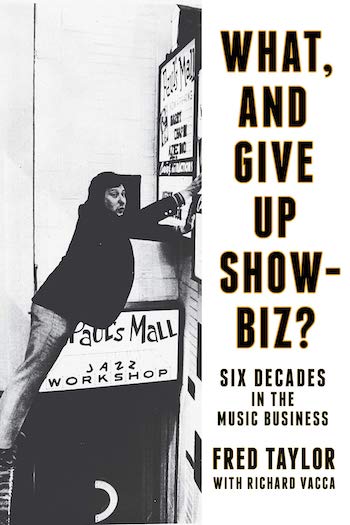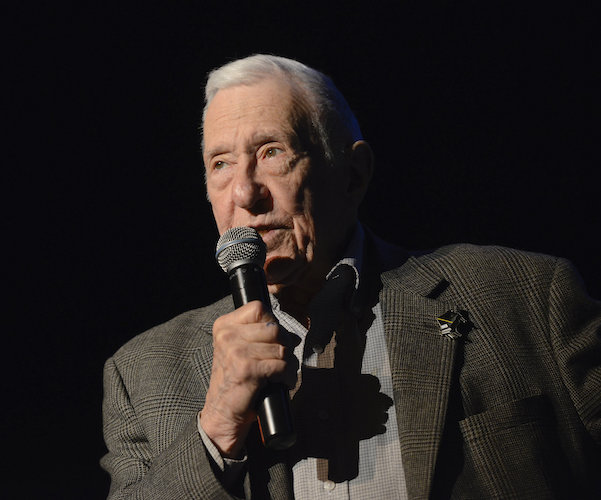Book Review: “What, and Give Up Showbiz?” — The Busy Life of Boston Impresario Fred Taylor
By David Daniel
Boston’s Fred Taylor, grandson of Jewish immigrants, was by turns (and often simultaneously) a recording engineer, promo man, artist manager, talent scout, press agent, newspaper columnist, concert promoter, club manager, nightclub owner, restaurant, and movie house owner.
What, and Give Up Showbiz?: Six Decades in the Music Business by Fred Taylor with Richard Vacca. Backbeat Books, 229 pages, with photos.
Buy at Bookshop
 For over 60 years, from the 1950s into the present era, Fred Taylor was a linchpin in helping to create and maintain Boston’s rich jazz and pop music scene. For anyone with an interest in how it all went down, his new memoir is a fabulous flight on gossamer wings.
For over 60 years, from the 1950s into the present era, Fred Taylor was a linchpin in helping to create and maintain Boston’s rich jazz and pop music scene. For anyone with an interest in how it all went down, his new memoir is a fabulous flight on gossamer wings.
I found many points of intersection between Taylor’s journey and my own, which began a couple generations later but trod some of the same musical roads. Mine took form one day in the mid-’70s when I cold-called at the editorial offices of the Patriot Ledger and asked if they needed someone to review music. My journalistic chops were skimpy: I’d written a column for my college newspaper, and had been a reporter in the army. The music I had in mind was rock and roll, the soundtrack I had grown up with. Jon Lehman, the arts and entertainment editor, explained that he already had someone reviewing rock, but … did I like jazz? With no hesitation, I said, “I love jazz!”
It was a canard. In truth, I’d only recently begun to listen to jazz, and I knew less than zero about its traditions, practitioners, and development as an American art form. But perhaps Lehman sniffed enthusiasm—or maybe he was weary of the stack of promo LPs towering near his desk. He shuffled through them, selected a few, and handed them over. “Write up something about these and we’ll see.”
After that I went to school on jazz, reading histories, bios of the greats, listening to the classics; and I took a stab at everything he’d give me. In time, my reviews of artists such as Sonny Rollins, Stanley Turrentine, Airto Moreira, Flora Purim, Gato Barbieri, and others were being quoted in the record companies’ press sheets, and I would get invitations to club dates.
I was too young to have been a habitué of the Jazz Workshop and the iconic Paul’s Mall—venues that Fred Taylor had already made famous—but I caught a later, scaled-down scene at rooms like Pooh’s Pub in Kenmore Square, Ryles, and the 1369 Jazz Club in Cambridge, and Willow in Somerville. And later, at Fred Taylor’s stylish Sculler’s, on the Charles. I got to know in a casual way local jazz jocks Tony Cennamo of WBUR, Eric Jackson of WBCN, and Ron Della Chiesa of WGBH. I also met Taylor on several occasions. He was by then legendary as the man making things happen, bringing in big names, breaking new acts. And he was a gentleman in the full sense, willing to take a little time out of a very busy life to chat. How busy he was — and how he became so — is the story thread of What, and Give Up Showbiz?.
One of the true entertainment business hyphenates, Taylor, grandson of Jewish immigrants, was by turns (and often simultaneously) a recording engineer, promo man, artist manager, talent scout, press agent, newspaper columnist, concert promoter, club manager, nightclub owner, and restaurant and movie house owner. Across the six decades of his career, he was all of these, but the title he was most proud of was impresario.
This book is a lovingly told chronicle of Taylor’s life from a young man toiling in the family mattress business to, over time, drifting into nervier challenges that came his way. As he says, “I never looked for a career or a job — they seemed to find me.” His geniality, work ethic, tech savvy and, increasingly as time went along, keen business sense combined with an openness to new experiences and a passion for jazz. All of this comes through in the breezy informality of his narrative voice. With rhetorical asides like “and that, my friends, is how I became a nightclub owner” and “we’ll dive into that in the chapters to come,” he comes across as a guy who sidles up and asks, “Got time for a story?”
At the start, in an effort to do more than mattress sales, he worked at getting gigs and recording dates for local jazz musicians. And while he continued this — in many cases he was instrumental in launching careers — his skill set grew and, as time went on, he nurtured connections with established performers. The roster is dizzying: Duke Ellington, Errol Garner, Miles Davis, Dave Brubeck, Bill Evans, Dizzy Gillespie, Ahmad Jamal, up through the ever-evolving musical tastes to include Dylan, the Stones, Linda Ronstadt, Springsteen, Earth Wind & Fire, Bob Marley, Diana Krall, Bette Midler, Al Jarreau, David Bowie, and scores more.
Taylor also featured comics. Richard Pryor, George Carlin, Joan Rivers, Lily Tomlin, Steve Martin, and many others headlined at his clubs. And as another example of how things came his way, he later got into movie exhibition when he took over the Harvard Square Theater.
Incredibly, for someone writing his story when he was in his 80s, he seems to remember it all. And not just performers. He knows the clubs and joints, the radio stations. He name-checks DJs, agents, managers, sound engineers, even the painters who created the skyline mural at Paul’s Mall. No one is left out. He either kept meticulous notes, had a laser memory, or both. And co-writer Richard Vacca, as manager of Taylor’s extensive collection of photos and memorabilia, was clearly of enormous help here.

Fred Taylor — a gentleman in the full sense. Photo: Fred Taylor Scholarship fund/Eric Antoniou.
Some of the details come with interesting anecdotes, like trying to figure how to book Freddie Hubbard and Barry Manilow on the same bill, or how a young Rodney Dangerfield’s blue material outraged José Greco, which led to Taylor’s never booking the comic again. A minor cavil: the book skids along too quickly and there aren’t nearly enough of these juicy tidbits. Consummate professional that Taylor is, his default setting is to find the good in people and situations.
Written with local jazz cognoscente Vacca (author of The Jazz Chronicles: Faces, Places, and Nightlife 1937-1962) this oral history is a smoothly readable (and upbeat) chronicle of a very busy life. Taylor comes across as humble, ever ready to give credit and to take justly earned kudos for a long life building and promoting a nationally respected entertainment community in Boston.
Like someone who can’t quite believe all this happened to him, Taylor remained active in music and cultural affairs right up into the past decade. Sadly, not long after his 90th birthday, and only months before the book was published, he died. Along with a scholarship fund, and other behind-the-scenes philanthropic activities, this story is an invaluable part of his impressive legacy.
David Daniel is the author of more than a dozen books, including four entries in the prize-winning Alex Rasmussen mystery series. His most recent book is Inflections & Innuendos, a collection of flash fiction. He is on the faculty at UMass, Lowell and blogs regularly @Richardhowe.com.
